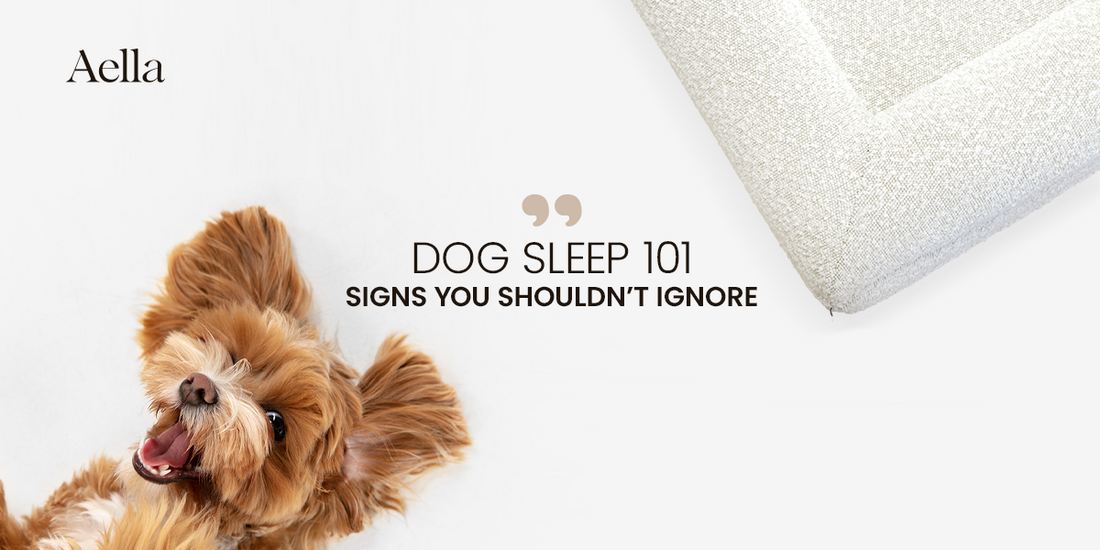
Dog Sleep 101: The Hidden Signs of Poor Sleep

Sleep is essential for dogs, just like it is for us. But while we can complain about a bad night’s sleep, our furry friends can’t tell us when they’re uncomfortable. Instead, they show subtle signs—signs that, if ignored, could lead to long-term health issues.
The Hidden Dangers of Poor Sleep in Dogs
Many dog parents don’t realize that their pet’s sleep habits can be a window into their overall health. Sleep disturbances can signal underlying problems such as:
- Joint Pain & Arthritis – Older dogs or breeds prone to joint issues may struggle to find a comfortable position, leading to constant shifting and restlessness.
- Respiratory Problems – Dogs with breathing difficulties might struggle to sleep deeply, especially if their bed doesn’t support an optimal sleeping posture.
- Cognitive Dysfunction (Dog Dementia) – Dogs experiencing cognitive decline often reverse their sleep cycles, staying awake at night and sleeping all day.
- Stress & Anxiety – A restless dog may not be physically uncomfortable but mentally stressed, affecting their ability to fall into a deep, restorative sleep.
If your pup isn’t sleeping well, it’s time to investigate.
What Is Bad Sleep for Dogs?
Many factors can lead to low-quality sleep in dogs, including:
- Unsupportive Sleeping Surfaces – Thin, lumpy, or worn-out beds fail to cushion their joints properly, causing pressure points and discomfort.
- Poor Sleep Positions – If your dog sleeps curled up too tightly or sprawled out uncomfortably, they might not have the right support.
- Inconsistent Sleep Schedules – Sudden changes in sleep timing or frequent night awakenings can indicate a disrupted sleep cycle.
Dogs spend around 12-14 hours a day sleeping, but if they’re not getting deep, restful sleep, their health can slowly decline.
How to Recognize Signs of Sleep Issues in Dogs
Since our pups can’t tell us when something’s wrong, it’s up to us to spot the signs. Here’s what to watch for:
- Frequent Tossing & Turning – If your dog is constantly shifting, they may be struggling to get comfortable due to joint pain or a poor-quality bed.
- Heavy Panting or Labored Breathing – A resting respiratory rate over 35 breaths per minute can indicate heart issues or stress.
- Excessive Daytime Sleeping – If they’re drowsy all day, their nighttime sleep quality might be poor.
- Stiffness or Slow Movements After Waking Up – This can signal joint discomfort caused by a lack of orthopedic support during sleep.
Recognizing these early red flags can help prevent serious health problems down the line.

How to Improve Your Dog’s Sleep & Overall Health
The good news? There are simple ways to help your pup sleep better and stay healthier longer.
- Choose an Orthopedic Dog Bed – A high-quality bed that supports joints, distributes weight evenly, and provides proper alignment is crucial, especially for senior dogs or large breeds.
- Monitor Their Sleep Environment – Keep their space calm, quiet, and free from disruptions like loud noises or extreme temperatures.
- Encourage a Consistent Routine – Feeding, exercise, and bedtime should follow a predictable schedule to regulate their internal clock.
- Track Their Breathing & Movements – Noticing changes early can help prevent more serious conditions from developing.
Why Aella Bed is the Right Choice for Long-Term Dog Health
At Aella, we believe that better sleep leads to better health. That’s why we designed Aella Bed, an Orthopedic dog bed that offers:
- Joint & Pressure Relief – Our high-density orthopedic foam provides superior support, reducing strain on joints and improving posture.
- Breathable & Hypoallergenic Materials – Helps regulate
